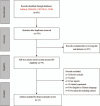A systematic review of clinical studies on electrical stimulation therapy for patients with neurogenic bowel dysfunction after spinal cord injury
- PMID: 30313096
- PMCID: PMC6203582
- DOI: 10.1097/MD.0000000000012778
A systematic review of clinical studies on electrical stimulation therapy for patients with neurogenic bowel dysfunction after spinal cord injury
Abstract
Background: This study aimed to perform a systematic literature review of the clinical trial evidence on electrical stimulation for the treatment of neurogenic bowel dysfunction (NBD) after spinal cord injury (SCI).
Methods: Systematic electronic searches were carried out in the PubMed/Medline, EMBASE, Cochrane Central Register of Controlled Trials, and China National Knowledge Infrastructure databases, along with the reference lists in the include studies. Studies were eligible for inclusion if they adopted a controlled clinical design based on human population, the patients suffered from spinal cord injury, the main outcomes were the disorders of bowel function and the intervention was electrical stimulation. Also, the language was limited to English and Chinese.
Results: Eleven studies were included in this systematic review, comprising transcutaneous electrical stimulation, transrectal bowel stimulation, sacral nerve stimulation, intravesical electrical stimulation, etc. Of the 11 studies, 3 were randomized controlled trials, 8 were controlled before-and-after trials. The quality of the included studies was moderate bias risk. Most studies revealed that the electrical stimulation was beneficial for the patient with NBD after SCI.
Conclusions: Only 11 small clinical studies with 298 participants have evaluated the efficacy of electrical stimulation for NBD after SCI. Although some studies showed electrical stimulation was benefit for the patient with NBD after SCI, there was currently not enough evidence to support the use of electrical stimulation could improve the clinical symptoms of those patients. Thus, well-designed randomized controlled trials with larger patient population are warranted to establish its benefit in clinical practice in the future.
Conflict of interest statement
The authors report no conflicts of interest.
Figures
References
-
- Definitions. Definitions for neurogenic bowel. Available at: http://www.definitions.net/definition/neurogenic%20bowel. April 27th, 2017.
-
- Krogh K, Nielsen J, Djurhuus JC, et al. Colorectal function in patients with spinal cord lesions. Dis Colon Rectum 1997;40:1233–9. - PubMed
-
- DeLisa JA, Kirshblum S. A review: frustrations and needs in clinical care of spinal cord injury patients. J Spinal Cord Med 1997;20:384–90. - PubMed
Publication types
MeSH terms
LinkOut - more resources
Full Text Sources
Medical


